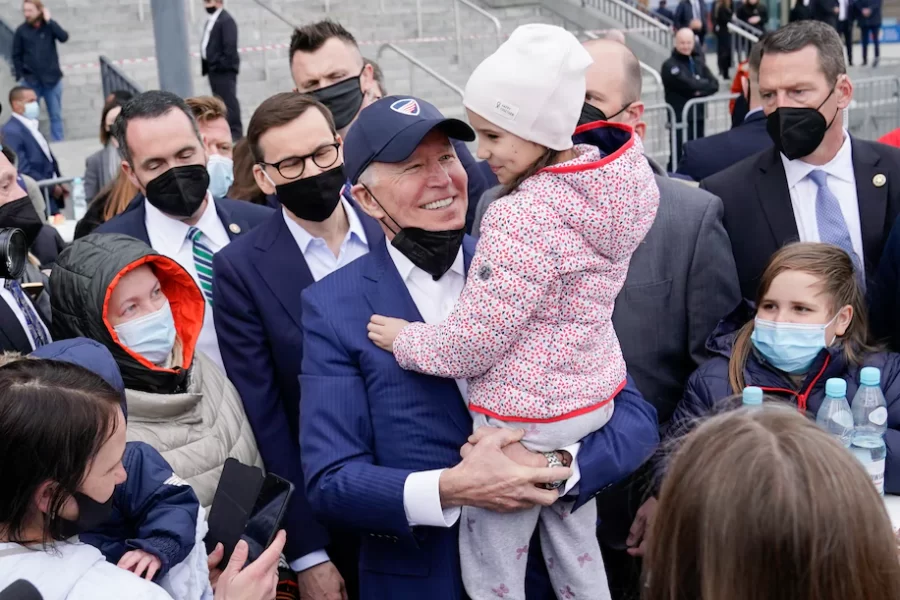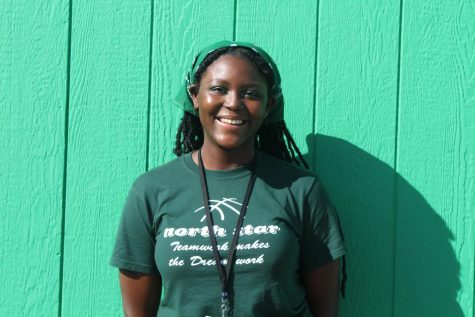Media and Government’s Bias Towards Ukrainian Refugees Compared to Black and Brown Refugees
Image from the Washington Post (Evan Vucci/AP) that showcases President Biden meeting with Ukrainian refugees in Warsaw
May 12, 2022
Ever since the invasion of Ukraine on February 24, 2022, news about the war has dominated the global media. Flashback to a couple months before the invasion, August 30, 2021, when the United States completed it’s withdrawal from Afghanistan. As a result of the chaotic withdrawal, many Afghans fled their homes and saught refuge in other countries. Fast forward to Ukraine and many Ukrainians are fleeing away from the danger that the war has brought to their country. However, a key difference in these two cases is the news reporting and the response to refugee situations. The media tone surrounding Ukrainian refugees has been positive. However, this has not been the case compared to Afghan refugees and refugees and immigrants from black and brown countries.
The treatment of refugees from Ukraine has been swift and effective as much as possible. Abigail Hauslohner reported in an article for the Washington Post that “The Department of Homeland Security [has] unveiled its program to accelerate the admissions process for Ukrainians, allowing U.S.-based family members, organizations and other groups to apply, using a dedicated website, for specific individuals to gain entry into the United States.” In addition, President Biden created a refugee response program called Uniting for Ukraine. The purpose of the program is to “ease requests for humanitarian parole, [provide] a two-year legal status, after which Ukrainians who wish to remain in the United States permanently must apply for asylum or another immigrant status.” Moreover, the process is free and has less paperwork that is often associated with the more traditional program.
The United States is set up properly to receive Ukrainian refugees but was unprepared for refugees from Afghanistan. The same article by Hauslohner highlighted the fact that “there is no dedicated resource like Uniting for Ukraine to facilitate Afghans’ applications, their requests have flooded the government’s general humanitarian parole program. The associated fee is $575 per applicant… [and] requires applicants to prove they are under direct threat.” Moreover, Ukrainian refugees have been offered housing and people are being encouraged to house them and many people are willing to. However, Afghan refugees are not given the same opportunities. Many Afghan refugees are ¨still living in hotel rooms and other temporary housing across the U.S., some for months, as they wait for permanent housing” according to an article by Joel Rose. In addition, resettlement agencies are accrediting this difficulty to ¨a severe shortage of affordable housing.¨ It begs the question; where are those good Samaritans that were more than willing to open their doors to Ukrainian refugees?
It is disheartening to see the differences in the treatment of these two groups of people because refugees from both of these countries are experiencing similar situations. Likewise, the lack of urgency from the Biden administration on the Afghan refugee situation is highly unjust considering the fact that many Afghans that worked alongside and for the U.S. government during the U.S. 20 years stay in Afghanistan have been left behind along with their families. In addition, the United States knew that the exit of American troops from Afghanistan would not be an easy task and still failed to properly prepare for the humanitarian crisis that many Afghans would be thrusted in. However, they are more than willing to welcome Ukrainian refugees into the United States. This too begs the question of why that bias exists and the media coverage seems to have some answers.
The news coverage of Ukrainian refugees compared to refugees form black and and brown countries has been shocking but not surprising. As news of the war broke out, the reaction of people across the world has been revealing. CBS News Anchor Charlie D’Agata commented on the situation, stating that “[Ukraine] isn’t a place, with all due respect,… like Iraq or Afghanistan that has seen conflict raging for decades… [it] is a relatively civilized, relatively European.” His comment received a lot of backlash and rightfully so. It is insulting to insinuate that Middle Eastern countries are not civilized especially considering the rich history of those countries and Europe’s immoral involvement in that area of the world.
Unfortunately, he is not the only one that has a similar view. French journalist Phillippe Corbe relayed similar remarks. He stated that “we’re not talking here about Syrians fleeing the bombing of the Syrian regime backed by Putin. We’re talking about Europeans leaving in cars that look like ours to save lives.” So, would the violence be okay if they were Syrians? Black and brown people are deserving of the same sympathy and empathy from the world even if they don’t have the same cars as many Europeans. Also, considering France’s relationship with people from the Middle East in their country, Corbe’s remarks are not surprising.
Another European weighed in on the situation. David Sakvarelidze, the former Ukrainian Deputy Prosecutor, who was a guest on BBC said “I see European people with blue eyes and blonde hair being killed, children being killed everyday with Putin’s missiles.” The blue eyes and blonde hair comment is unnecessary and revealing at the same time. As much as I like the fact that Ukrainian refugees are receiving the care and attention they deserve from the world, it is a bittersweet situation. Black and brown people may not be European or have blue eyes and blonde hair but their refugee situations should also receive the same level of care and attention that they have long deserved.




